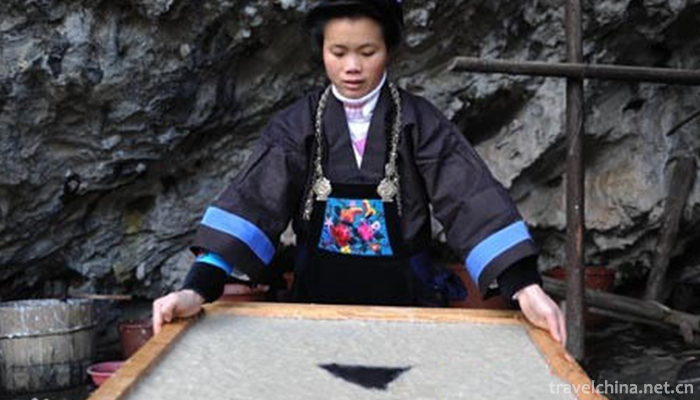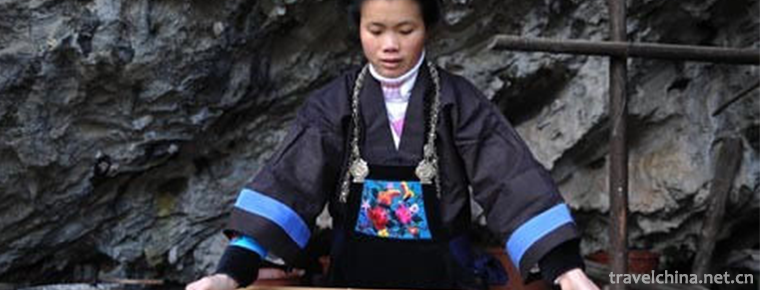Leather Paper Making Skills
Leather Paper Making Skills
Leather paper making technology, Guizhou local traditional handicraft, one of the national intangible cultural heritage.
Leather paper making is an ancient Chinese traditional handicraft. Paper making is one of the four great inventions in ancient China. Bamboo paper and leather paper made from bamboo and tussah bark are two important varieties of traditional handmade paper. Guizhou is a minority inhabited area, and many areas of Guizhou still retain the ancient skills of traditional bamboo paper and leather paper making, among which Xiangzhigou (Buyi nationality), Xiaotun of Zhenfeng County and Shiqiao (Miao nationality) of Danzhai County are the most outstanding ones.
On May 20, 2006, the technology of making leather paper was approved by the State Council and listed in the first batch of national intangible cultural heritage list, the heritage number_-67.
Technological characteristics
Taking bamboo paper produced in Xiangzhigou as an example, it is said that it began in Hongwu period of Ming Dynasty and has a history of more than 600 years. The whole operation process includes 72 processes such as cutting bamboo, breaking bamboo, fencing bamboo, cooking, grinding, pulping, paper making, pressing and drying, which are exactly the same as the paper-making method in Song Yingxing's Tiangong Kaiwu. Its products are both soft and tough, with invisible bamboo patterns and a light fragrance.
The white sponge paper produced in Xiaotun, Zhenfeng County, was originated in Xianfeng period of Qing Dynasty. Up to the end of last century, there were still more than 1000 households engaged in paper making. The paper is made from the skin of the fabric, and the whole set of operation has also undergone 72 processes. The finished product is soft, smooth and soft.
The white paper produced by Shiqiao in Danzhai County is also made of Chinese fir root and bark. In addition, color paper is also produced, including Yunlong fold, concave and convex, flattening, flower and grass, hemp paper. There are more than ten links in the production process. The cotton flocculent pulp is mixed with water and blended with "slipper". The product is packaged by copying, pressing, drying and uncovering. The paper is soft, smooth and water-resistant.
Inheritance Significance
Hand-made paper products have strict requirements on raw materials, water quality and technology. The inheritance of skills depends on oral teaching and heart-to-heart teaching, accompanied by manufacturing, resulting in a rich paper industry custom. Every year, Cai Lun, the master of paper making, is sacrificed. In these cases, the related bamboo paper and leather paper manufacturing techniques have become an important evidence of cultural diversity and national identity. However, under the strong impact of the modern paper industry, the inheritance of these complex and difficult Ancient Papermaking methods has become a problem, which needs to be rescued and protected.
Technological process
There are two processes and more than 30 processes in the production of Longyou Shanya Yanpi paper. One is the production process of leather materials, including chopping, steaming, peeling, steaming, steaming, steaming, spreading, drying, billet making, tearing, cooking, kneading, extrusion, spreading, washing, beating, skinning, washing, drying, bagging and other processes; the other is the production process of finished products, including squeezing, fur troughing, juicing, stirring, paper pressing, baking, paper checking, paper cutting, packaging and so on. Preface. More than 50 kinds of tools with different functions such as Jishan knife, scraper, hydrazone knife, steamer, paper curtain, curtain bed and slot angle are needed in production.
The production process of Longyou Mountain Yanpi Paper depends entirely on the naked eye observation and hand experience of craftsmen. For example, in the paper fishing process, the depth of the curtain bed into the pond and the size of the waves can only be operated by the eye and feel, so as to determine the quality of the finished paper. With the technology of making yam goose skin paper, more than 30 varieties of painting fairy paper, stationery paper, national color paper and special paper can also be processed. They are not only used for painting and calligraphy, but also for binding and packaging.
Inheritance and Protection
Heritage figures
Luo Shouquan, male, Buyi nationality, born in 1942, is from Xiangzhigou, Xinbao Township, Wudang District, Guiyang City, Guizhou Province. In May 2006, the paper making skills were listed in the first batch of national intangible cultural heritage list of traditional skills.
protective measures
National-level inheritors such as Wan Aizhu also guard this ancient handicraft, and actively take protective measures to collect and sort out traditional technological processes, raw material formulations and papermaking equipment, protect the interests of old artists, establish a paper culture museum, and carry out exchange activities of handicraft papermaking skills.


-
2.waterless rice noodle
Bait silk is one of the special snacks in Yunnan. It is mainly made from rice
Time 2018-10-17 -
3.Peace Hotel Shanghai
Peace Hotel is a landmark building in Shanghai. Located at No. 20 East Nanjing Road, Huangpu District, Shanghai, it is the first modern building in the history of modern architecture in Shanghai
Time 2018-12-16 -
4.Hongfeng Lake Scenic Area
Hongfeng Lake Scenic Spot is located in the western suburb of Guiyang City, Guizhou Province, China. It is 28 kilometers away from Guiyang, the capital of Guizhou Province.
Time 2019-01-16 -
5.Qinghui Garden
Qinghui Garden is an ancient garden building built in Ming Dynasty. Located in Qinghui Road, Daliang Town, Shunde District, Foshan City, Guangdong Province,
Time 2019-02-07 -
6.Cloth tiger
Cloth tiger is a kind of traditional handicraft which has been widely spread among Chinese people in ancient times. It is also a good toy for children, indoor decoration
Time 2019-04-04 -
7.Custom of sacrificing ancestors to the great locust tree in Hongdong
During the period from Hongwu to Yongle in the Ming Dynasty, an unprecedented migration took place under the great locust tree in Hongtong. It lasted 50 years and moved 18 times
Time 2019-05-03 -
8.Hainan opera Qiongju Opera
In June 2008, Qiongju Opera declared by Hainan Qiongju Theatre and Haikou City was listed in the second batch of national intangible cultural heritage list with the approval of the State Council.
Time 2019-06-11 -
9.Manufacturing Techniques of Fukushima Ship with Watertight Cabin
The manufacturing technology of watertight compartment Fukushima, the local traditional handicraft technology of Jiaocheng District in Jinjiang and Ningde City, Fujian Province, is one of the national
Time 2019-06-15 -
10.Anhui Agricultural University
Anhui Agriculture University is located in Hefei, capital of Anhui province. Center Urban area Key universities in Anhui By Ministry of agriculture and rural People's Republic of China State Forestry
Time 2019-10-10 -
11.The changing style of Cheongsam
After a hundred years of evolution, with the change of people's life style and aesthetic taste, cheongsam has developed a variety of styles, which makes people dazzled. In the golden age of the development of Cheongsam in the 1930s and 1940s, the styles of cheongsam changed
Time 2020-12-11 -
12.Deyang Education
By the end of 2018, Deyang had 856 schools, with 33000 full-time teachers and 543000 students. Among them, 339 primary schools enroll 32000 students and 185000 students; 123 junior high schools, 28000 students and 80000 students; 23 senior high schools
Time 2020-12-14